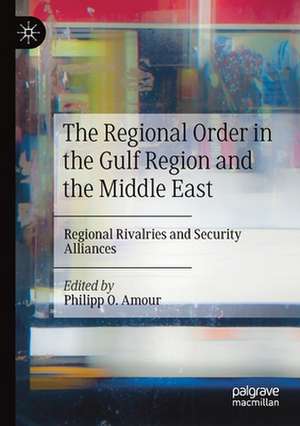The Regional Order in the Gulf Region and the Middle East: Regional Rivalries and Security Alliances
Editat de Philipp O. Amouren Limba Engleză Paperback – 5 iul 2021
| Toate formatele și edițiile | Preț | Express |
|---|---|---|
| Paperback (1) | 951.29 lei 6-8 săpt. | |
| Springer International Publishing – 5 iul 2021 | 951.29 lei 6-8 săpt. | |
| Hardback (1) | 953.65 lei 3-5 săpt. | |
| Springer International Publishing – 5 iul 2020 | 953.65 lei 3-5 săpt. |
Preț: 951.29 lei
Preț vechi: 1160.10 lei
-18% Nou
Puncte Express: 1427
Preț estimativ în valută:
182.03€ • 198.35$ • 153.39£
182.03€ • 198.35$ • 153.39£
Carte tipărită la comandă
Livrare economică 23 aprilie-07 mai
Preluare comenzi: 021 569.72.76
Specificații
ISBN-13: 9783030454678
ISBN-10: 3030454673
Pagini: 446
Ilustrații: XXIII, 446 p. 1 illus.
Dimensiuni: 148 x 210 mm
Greutate: 0.61 kg
Ediția:1st ed. 2020
Editura: Springer International Publishing
Colecția Palgrave Macmillan
Locul publicării:Cham, Switzerland
ISBN-10: 3030454673
Pagini: 446
Ilustrații: XXIII, 446 p. 1 illus.
Dimensiuni: 148 x 210 mm
Greutate: 0.61 kg
Ediția:1st ed. 2020
Editura: Springer International Publishing
Colecția Palgrave Macmillan
Locul publicării:Cham, Switzerland
Cuprins
Chapter 1. Introduction: The regional order in the Gulf Region and the Middle.- Part 1. Security alliances in the Gulf region and the Middle East.- Chapter 2. Political Islam as an ordering factor? The reconfiguration of the regional order in the Middle East since the “Arab Spring”.- Chapter 3. Gulfization of the Middle East Security Complex: the Arab Spring’s Systemic Change.- Chapter 4. The conservative-resistance camp: The Axis of Resistance.- Chapter 5. The Emergence of the Turkish-Qatari Alliance in the Middle East: Making of the Moderate Resistance Bloc.- Part 2. State actors and non–state militant actors.- Chapter 6. Expanding the Turkish bid for Regional Control in the Somali Regional Security Complexes.- Chapter 7. Qatar’s Calculated Gamble on the Syrian Muslim Brotherhood.- Chapter 8. (Un)Limited Force: Regional Realignments, Israeli Operations and the Security of Gaza.- Chapter 9. The evolution of Iraq’s Hashd al-Sha’abi (Popular Mobilization Forces).- Chapter 10. Between the PYD and DAESH: the rise of non-state actors in Syria.- Part 3. External actors.- Chapter 11. Domestic and External Factors in the 2011 Syrian Conflict: Towards a Multi-Causal Explanation.- Chapter 12. Lending an ‘Old Friend’ a Hand: Why Does Russia Back Syria?.- Chapter 13. Contribution of Water Scarcity and Sustainability Failures to Disintegration and Conflict in the Arab Region – The case of Syria and Yemen.- Chapter 14. The regional system in the Gulf Region and the Middle East in retrospect and prospect.
Notă biografică
Philipp O. Amour is an Associate Professor of International Relations at Sakarya University and a frequent Visiting Professor at Boğaziçi University, Turkey. He has published scholarly articles in the International Journal of Middle East Studies and British Journal of Middle Eastern Studies as well as book chapters with leading publishers.
Textul de pe ultima copertă
This book examines the regional order in the Gulf Region and the wider Middle East, focusing on regional rivalries and security alliances. The authors analyze the regional system in terms of its general structure as well as the major inter-state and non-state security alliances. The structure of the regional system in the wider Middle East and the shake-ups it has experienced explain the ongoing regional rivalry and polarization since 2011 in hotspots such as Syria, Yemen, and Libya. As such, the various chapters address regional transition and power dynamics between and among regional great powers and non-state militant actors across the Gulf Region and the wider Middle East in terms of the alliance building, persistence, and disintegration since 2011.
Philipp O. Amour is an Associate Professor of International Relations at Sakarya University and a frequent Visiting Professor at Boğaziçi University, Turkey. He has published scholarly articles in the International Journal of Middle East Studies and British Journal of Middle Eastern Studies as well as book chapters with leading publishers.
Philipp O. Amour is an Associate Professor of International Relations at Sakarya University and a frequent Visiting Professor at Boğaziçi University, Turkey. He has published scholarly articles in the International Journal of Middle East Studies and British Journal of Middle Eastern Studies as well as book chapters with leading publishers.
Caracteristici
Examines the regional order in the Gulf and the Middle East, focusing on regional rivalries and security alliances Analyzes the regional system in the Gulf and wider Middle East Explores the impact of significant external actors, notably the USA and Russia
